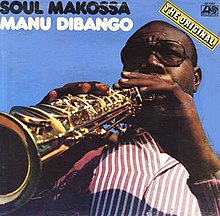| "Soul Makossa" | ||||
|---|---|---|---|---|
 | ||||
| Single by Manu Dibango | ||||
| from the album Soul Makossa | ||||
| A-side | "Hymne de la 8e Coupe d'Afrique des Nations" (original) | |||
| B-side | "Lily" (reissue) | |||
| Released | 1972 | |||
| Recorded | 1971 | |||
| Genre | Makossa | |||
| Length | 4:30 (original non-edited version) | |||
| Label | Fiesta Records (France) Atlantic Records (US) London Records (UK/Canada) BorderBlaster (Europe) | |||
| Songwriter(s) | Manu Dibango | |||
| Manu Dibango singles chronology | ||||
| ||||
| TV performance | ||||
| "Soul Makossa" (ORTF, 1973) on YouTube | ||||
"Soul Makossa" is a song by Cameroonian saxophonist and songwriter Manu Dibango, released as a single in 1972. It is the most sampled African song in history.[1] The song was originally recorded as the B-side for "Hymne de la 8e Coupe d'Afrique des Nations", a song celebrating the Cameroon national football team's accession to the quarterfinals of the Africa Cup of Nations football tournament, as well as Cameroon's hosting the games for the first time; the lyrics were written by Cameroonian poet and musicologist S.M. Eno Belinga. Except for some words in English, it was written in Duala, a native dialect continuum from Cameroon. Manu Dibango later recorded a new version for his 1994 album Wakafrika, titled "Mouvement Ewondo".[2]
In 1972, David Mancuso found a copy in a Brooklyn West Indian record store and often played it at his parties at The Loft.[3] The response was so positive that the few copies of "Soul Makossa" in New York City were quickly purchased.[3] The song was subsequently played heavily by Frankie Crocker, who deejayed at WBLS, then New York's most popular black radio station.[3] Since the original release was so obscure, at least 23 groups quickly released cover versions to capitalize on the demand for the record.[3]
Later in 1972, American-based Atlantic Records licensed the original Manu Dibango version from French record label Fiesta, and released it as a single (with the B-side track being "Lily"). The single peaked at number 35 on the US Billboard Hot 100 chart in 1973; Dibango's original version of the song and a cover by Afrique were on the US Billboard Hot 100 chart at the same time.[3][4][2] The song also became an international hit leading to even more cover versions by various groups around the world.[2]
The song is probably best known for the chanted vocal refrain "ma-ma-ko, ma-ma-sa, ma-ko ma-ko-sa", which was adapted and used in songs by many prominent artists such as Michael Jackson's "Wanna Be Startin' Somethin'" from his album Thriller (1982) and Rihanna's hit single "Don't Stop the Music" from Good Girl Gone Bad (2007). The refrain is a play on the word makossa, Dibango's main music genre.[5]
In 2011, a second version of the song titled "Soul Makossa 2.0" was recorded in France by Manu Dibango and Wayne Beckford and was issued as the first single from Dibango's album, Past Present Future.
The 2024 PBS series Disco: Soundtrack of a Revolution explores the importance of "Soul Makossa" to the history of disco music.[6]
- ^ Durosomo, Damola (8 May 2020). "This Video Explores the Countless Songs That Sample Manu Dibango's 'Soul Makossa'". Okay Africa. Archived from the original on 14 May 2020. Retrieved 10 January 2024.
- ^ a b c Cite error: The named reference
worldwas invoked but never defined (see the help page). - ^ a b c d e Cite error: The named reference
beatwas invoked but never defined (see the help page). - ^ Cite error: The named reference
heartwas invoked but never defined (see the help page). - ^ Ben Zimmer (26 June 2009). "Ma ma se, ma ma sa, ma ma coo sa". Language Log. Retrieved 25 June 2011.
- ^ "Disco: Soundtrack of a Revolution | Rock the Boat | Episode 1 | PBS". PBS.